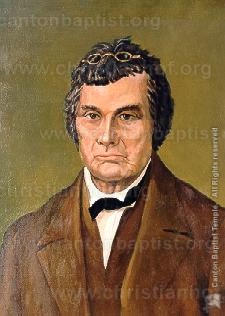Peter Cartwright
1785 – 1873
Peter Cartwright was born in Amherst County, Virginia. His father was a colonial soldier in the War of Independence. Shortly after the war, the family moved to Kentucky. Peter Cartwright was reared in frontier surroundings, and like many of the young men in that primitive area, engaged in sinful practices. His mother, a devout Christian woman, opened their cabin home for preaching by the Methodist circuit preachers. As a young man of sixteen, Peter was convicted of his sins as a result of these meetings, and after several weeks of deep agony and contrition, he was “soundly converted” at an outdoor revival meeting. His new faith completely changed his life, and Cartwright immediately began to witness for Christ.
One year later he was licensed as an “exhorter” and began riding a circuit of his own. His appointments were few and far between, and he preached wherever people would open their homes, because “meeting houses” were few. This was the beginning of his long career as a circuit-riding Methodist preacher. Cartwright was a “hellfire and brimstone” preacher after the style of Wesley, and his character and personality often matched his sermons. Often he personally thrashed the “rowdies” who disturbed his camp meetings, after which he saw many of them “get religion.”
His fearlessness is described in an incident which took place in Nashville. As he was preaching, General Andrew Jackson entered the service. The local preacher whispered the news to Cartwright which prompted him to thunder, “And who is General Jackson? If General Jackson doesn’t get his soul converted, God will damn him as quickly as anyone else.” Jackson smiled and later told Cartwright that he was a “man after my own heart.”
In over fifty years of traveling circuits in Kentucky, Tennessee, Ohio, Indiana and Illinois, Cartwright received ten thousand members into the Methodist Church, personally baptized twelve thousand people, and preached more than fifteen thousand sermons. He was strongly opposed to easy religion, education and culture in the ministry. His equipment consisted of a black broadcloth suit and a horse with saddlebags, while his library was composed of a Bible, a hymnbook, and a copy of Methodist Discipline. He was the epitome of the Methodist circuit riders who firmly planted the “old time religion” in the frontier of the infant United States of America.

